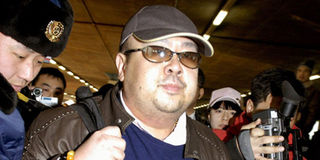Eldest son of N. Korea’s Kim ‘opposes dynasty’

This file photo taken on February 11, 2007 shows a man believed to be North Korean leader Kim Jong-Il's eldest son, Kim Jong-Nam walking among journalists upon his arrival at the Beijing airport. The eldest son of North Korean leader Kim Jong-Il said he opposes the hereditary transfer of power to his brother in the communist state, in an interview with Japan's TV Asahi broadcast on October 12, 2010. AFP | NATION
Tokyo, Tuesday
The eldest son of ailing North Korean leader Kim Jong-Il said he opposes plans for a hereditary transfer of power to his younger half-brother in the communist state, in rare comments aired today.
The views of exiled Kim Jong-Nam come as the regime has signalled plans for a dynastic succession, including by broadcasting images of the heir-apparent Kim Jong-Un to its people from a huge military parade on Sunday.
Jong-Nam — who has lived in Macau and Beijing since apparently falling out of favour with his father in 2001 — offered his opinion in an interview with Japan’s TV Asahi, taped on Saturday in Beijing.
“Personally, I am opposed to the hereditary transfer to a third generation of the family,” Jong-Nam said, speaking in Korean.
However, the 39-year-old also said that he would accept his father’s choice and that “for my part, I am prepared to help my younger brother whenever necessary while I stay abroad”.
North Korea’s fragile leader himself took over power in the impoverished nation from his father and founding president Kim Il-Sung, who died in 1994, in the communist world’s only family succession.
In recent weeks the leader, who suffered a stroke two years ago, has signalled that he has chosen little-known Jong-Un as his successor.
Swiss-educated Jong-Un, who is believed to be aged about 27, was made a four-star general and given key party posts late last month, when his official photo was also published for the first time.
Jong-Nam also told TV Asahi about the Pyongyang succession plans: “As a matter of course, I think it was my father who made the decision. As I have had no interest in the matter, I don’t care at all.”
He added: “I hope my younger brother will do his best to make the lives of the North Korean people affluent.”
He also said there may have been “certain internal reasons” for the planned power shift from father to son, and that if this was the case, “I think we have to abide by it.”
A straight talker
Pyon Jin-Il, a Tokyo-based political analyst, said that Jong-Nam is “known to be a straight talker” and had made comments in the past that put him at odds with his father’s regime. “He gave the answer as he was well aware of criticism in South Korea against the hereditary succession,” he said, pointing out that Jong-Nam has extensive ties with South Korea. (AFP)




